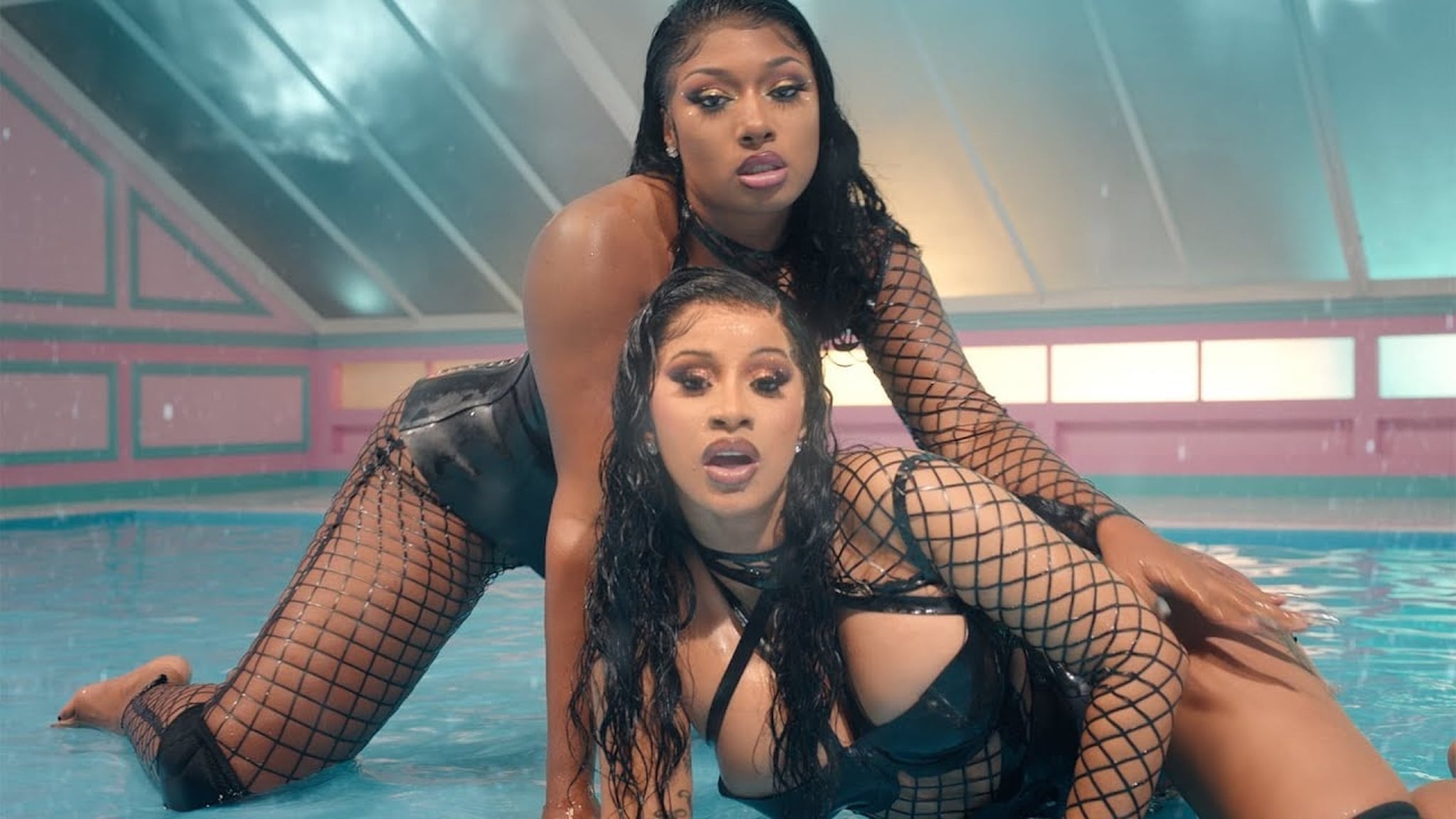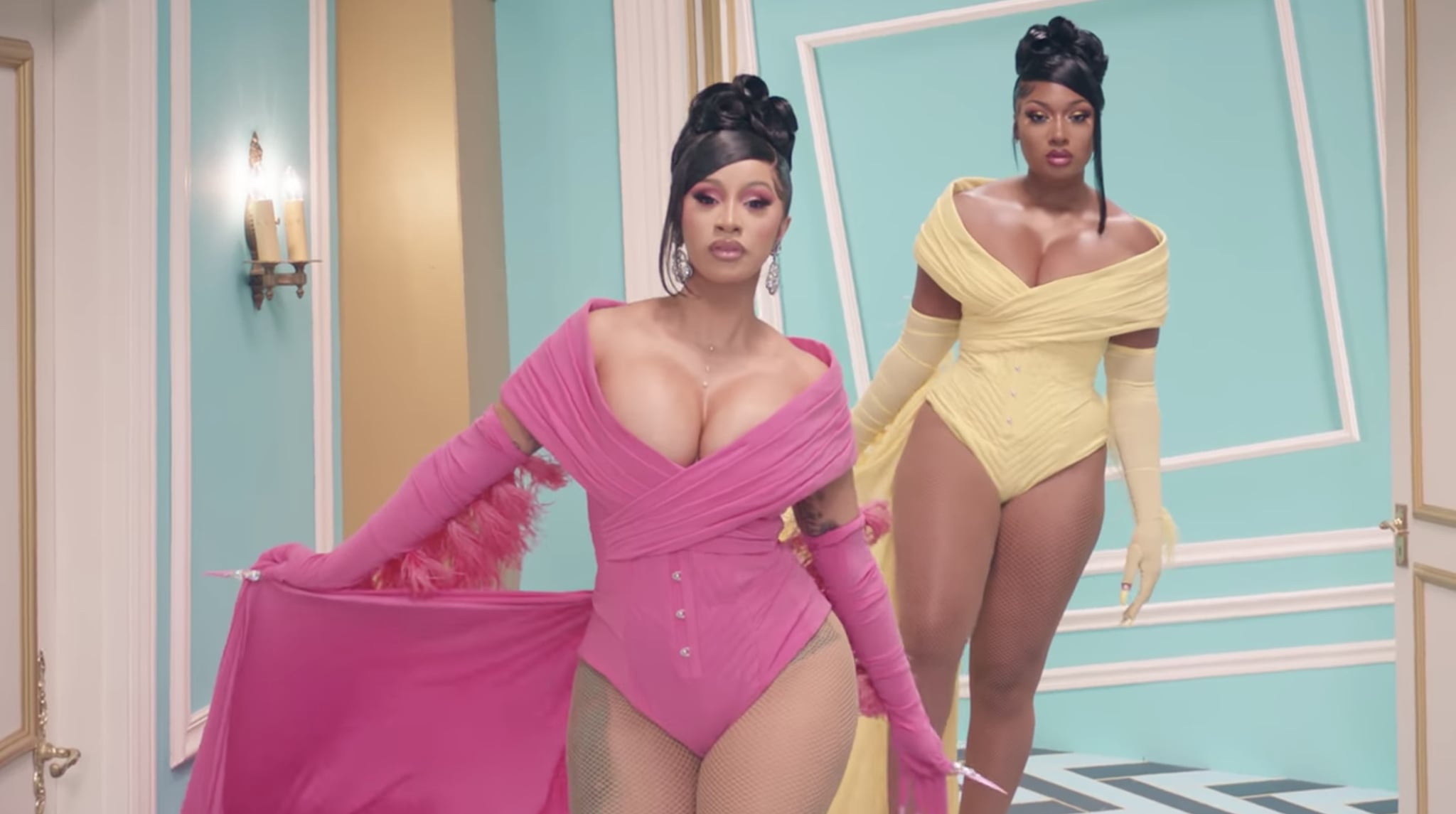
Perhaps the only thing that could irk our patriarchal society more than seeing women unapologetically reclaim their sexuality is seeing not one but two Black women do so. The exploitation and fetishization of Black female bodies is rooted in colonialism, and free of both literal and metaphorical shackles, Cardi B and Megan Thee Stallion spearheaded a new wave of female empowerment with the release of their first collaborative anthem, "WAP" [1].
As the title (an acronym for "wet ass p*ssy") became the subject of many a conversation, the video amassed more than 60 million views just four days after its debut in August 2020. Put simply, "WAP" is an unadulterated feast of fantasy costuming [2], twerking wall fixtures, and dance moves akin to a pliability and flexibility test. The pinnacle, however, is the openness in which female sexual pleasure is discussed and presented without the all-assuming male gaze. From her initial verse, Cardi obliterates the traditional housewife archetype with "I don't cook, I don't clean/But let me tell you how I got this ring," setting the tone that there is no bandwidth for stereotypical gender constructs.
As Cardi and Megan bask in their Blackness, while steering the sexual conversation in custom leopard and white tiger outfits, we are reminded of what Black women have endured in a society that has silenced and taken ownership of their bodies.
As Cardi and Megan explore the "WAP" playhouse [3], we're led into gloriously designed lairs as they tell us, in no uncertain terms, exactly what it is they want. Their explicit verses perfectly balance as Cardi takes a more submissive role, whereas Megan is undoubtedly more dominant. Their rampant sexiness is reinforced with the repetition of various animal prints that historically have become layered with various connotations, pivoting on the axis of classy and trashy, depending on the body that it adorns. A motif that has transcended socioeconomic status, before animal prints were fashion statements, the real furs that came before them were symbols of power, status, and wealth. Rooted in African aristocracy [4], they later became laced with sexual and erotic connotations as the link to the continent suggested a woman wearing animal print was savage, wild, and exotic — words that have plagued Black women since their fetishization by European colonizers. As Cardi and Megan bask in their Blackness, while steering the sexual conversation in custom leopard and white tiger outfits, we are reminded of what Black women have endured in a society that has silenced and taken ownership of their bodies.
![Cardi B - WAP feat. Megan Thee Stallion [Official Music Video]Kylie Jenner Makes a cameo in the video Cardi B - WAP feat. Megan Thee Stallion [Official Music Video]Kylie Jenner Makes a cameo in the video](https://media1.popsugar-assets.com/files/thumbor/pR-hWimcEr3IfehN0p5iKhCJnng/fit-in/2048xorig/filters:format_auto-!!-:strip_icc-!!-/2020/08/10/623/n/47175305/tmp_ShzEVc_e292cb092c7f83cb_Cardi-B-animal-print.jpg)
Criticism of the song was rife despite the video's undeniable success. Republican politicians
took to Twitter to express their disdain after the video's release, although one would imagine they would have had much more pressing subject matters [5] to focus on. In a since-deleted tweet [6], former congressional candidate DeAnna Lorraine wrote, "Cardi B & Megan Thee Stallion just set the entire female gender back by 100 years with their disgusting & vile 'WAP' song." Similarly, James P. Bradley, who is running for a Senate seat in California, tweeted [7], "Cardi B & Megan Thee Stallion are what happens when children are raised without God and without a strong father figure. Their new 'song' The #WAP (which i heard accidentally) made me want to pour holy water in my ears and I feel sorry for future girls if this is their role model!"
As we struggle to understand how he listened "accidentally," we are privy, once again, to the insufferable irony that the former president can claim that it's OK to "grab 'em by the p*ssy" but two women cannot discuss the moistness of their own.
It's the repeated hypocrisy that sex is taboo when women, particularly Black women, are steering the conversation.
It's the repeated hypocrisy that sex is taboo when women, particularly Black women, are steering the conversation. In the overwhelmingly male-dominated music industry, men have repeatedly rhymed, rapped, and cussed about how they intend to aggressively beat, blow up, or break a vagina, but it's a rarity that women so freely discuss their own sexual appetite with such authority. In many world cultures and religions, there is an unwavering fear toward female sexual pleasure. For many such cultures, it remains a deep-seated belief that women do not have the right to own their sexuality. This thought is not only stifling, it can lead to fatal consequences in the case of female genital mutilation.
There is a pervasive narrative that we're taught to be virtuous, good girls, but this notion of womanhood and femininity often means disempowered, quiet, and submissive. We have a right to seek and demand pleasure, too. The echo of fake orgasms is deafening as women are still unaware that sex is supposed to be an enjoyable act [8], one we should be encouraged to be active subjects in rather than merely passive objects. Our bodies are hypersexualized and plastered everywhere, and yet society still has a tight grip on the extent it wants us to discuss sex. The delicate balance of being sexy enough to attract male attention but not overtly so, at risk of being labeled a derogatory slur, perpetuates the ideology that a woman should be a "lady in the streets and a freak in the sheets." Frankly, it's 2021 and we will behave however we want, wherever we want. Cardi, Megan, et al. show us (again and again I might add [9]) that we can be sexually liberated beings without having to censor ourselves.

With women in hip-hop often pitted against each other, Cardi exemplifies the notion of women supporting women by opening up the stage to lesser-known musical talent. The inclusion of Normani, Rosalía, Rubi Rose, Mulatto, and Sukihana [10] sets the tone for what the future of any industry could be like, let alone the music industry, in which women aren't made to feel like competition. As Cardi publicly beamed [11] with an almost maternal pride for these women, we were reminded that, with Kylie Jenner and Sukihana, there are in fact three mothers in the video who all embrace their hypersexuality, which is an image society often prefers to ignore. Known as the Madonna-wh*re dichotomy [12], the Freudian theory suggests that being nurturing and being sexual are mutually exclusive and therefore a heightened amount of sexiness and sensuality would correlate with being a lesser mother. This damaging patriarchal construct demands women separate their sexuality from motherhood, despite the fact you cannot have one without the other. If there was any possibility that being a mother had somehow squandered Cardi's sexual abilities, she reminds us that she does "Kegels while it's inside."
Predictably, several commenters have suggested "WAP" panders to the male gaze, and while there may be some truth to that, what could be more liberating than capitalizing on the same construct built to suppress you? Profiting off male desires as she unashamedly spits her own, Cardi B is very clearly the driving force behind this work of art that sits proudly in the feminist canon. As we strive for intersectional feminism and an understanding that we are all empowered and liberated by different things, surely the epitome of modern feminism is women rapping about the self-lubricating prowess of their vaginas. Quite frankly, who else should dare to comment?